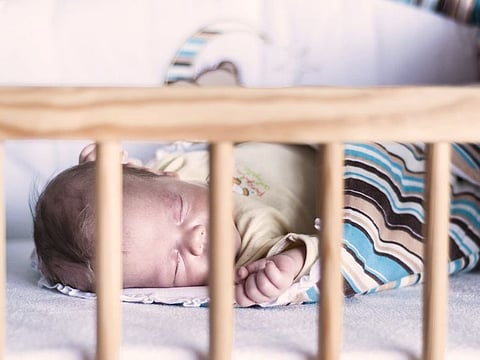Infants change sleep patterns in first two years: Study
Here's what you can do to help them get the best rest possible

Also In This Package
‘Is my child getting enough sleep?’ This question – and its variations such as, ‘is my baby sleeping too much?’ - is one of the most common concerns new parents have.
It’s natural, say studies. Sophie Jones, Sleep Consultant at Babies & Beyond, adds: “Sleep is vital for overall growth and development, particularly brain development; it allows us to process thoughts and feelings, allows the body to rest and recover and improves the ability to learn.”
But sleep cycles – at least in the first couple of years of a newborn’s life change and shift depending on a number of genetic and environmental factors. According to a new study in the journal ‘Normal sleep development in infants: findings from two large birth cohorts’, “Large changes take place in the sleep of infants during their first two years: the time taken to fall asleep reduces to an average of 20 minutes by the age of 6 months, and by the age of two small children wake up on average only once during the night.”
“At the same time, the total amount of time spent sleeping reduces to around 12 hours per day as daytime naps get shorter,” it adds.
The study, carried out by the Finnish Institute for Health and Welfare (THL) and the University of Turku, also found that 40 per cent of the parents of eight-month-old children who participated in the study were concerned about their child's sleep.
So how much should a child sleep really?
Dubai Health Authority explained earlier this year that newborns need between 14 and 17 hours of sleep time. This time, explains American Sleep Association, allows a body to generate the human growth hormone, helping a baby develop better.
An infant meanwhile needs anywhere from 12 to 15 hours of sleep and a toddler, i.e. between the ages of one and three, between 11 and 14 hours.
Experts agree that routine is one of the key elements to a baby’s happy sleep-time. “Routine is essential for developing healthy sleep habits. Routine provides children with structure to their day, ensuring that they have the adequate sleep and nutrition for growth and development. Routine also provides children with an understanding of ‘what is coming next’ and what is expected of them,” explains Jones.
She explains that if a parent is having trouble with sending a baby to lullaby land, they should first scan a child’s current routine to see if they can identify any patterns or reasons for night waking. “A diary can be very useful to track and to monitor this. Seeking professional advice can be a constructive and independent means of observing and agreeing upon an adjusted routine,” she adds.
She stresses: “Establishing an age-appropriate routine for your child and above all, ensuring that you remain consistent is key.”
Is putting them to bed later a way to get them to sleep longer?
Actually, no. “An earlier bedtime and night-time routine is key to ensure a child does not become over-tired, often leading to difficulties with sleep,” explains Jones.
“The sleep hormone, melatonin is typically released as it becomes dark and this is the optimal time for a child to be going to bed,” she adds.
Why does breastfeeding sometimes put a baby to sleep?
According to a study published in the journal ‘Pediatrics’ in 2010, there’s a simple explanation for this – and for why breastfeeding makes a child groggier at night. Researchers found that concentrations of three nucleotides most strongly associated with sleep and sedation (5’UMP, 5’AMP and 5”GMP) varied according to time of day. Concentrations of 5’AMP were highest at the beginning of the night, while levels of 5’GMP and 5’UMP increased as the night wore on. These sedatives were found at much lower concentrations in milk expressed during the day. The rise in nocturnal levels of 5'AMP, 5'GMP, and 5'UMP could be involved, explained the study ‘The possible role of human milk nucleotides as sleep inducers, in inducing the 'hypnotic' action of breast-milk at night in the infant.
What does nutrition have to do with a healthy sleeping pattern?
A lot. Just like being bloated may cause an adult to lose sleep, tummy trouble may result in a sleepy, cranky, but very, very awake baby.
For a happy snooze fest, what should you really be tweaking?
SleepFoundation.org explains that because very young babies have yet to develop a circadian rhythm, they rarely sleep through the night. If they don’t fall back asleep naturally, try soothing them by talking or with touch, without picking them up. If they continue to cry, they may be hungry or need their diaper changed. Quickly and quietly fix the problem, using only a nightlight if possible, and calmly leave the room.
Jones explains a few tricks to getting your young one into a sleepy place:
0 - 1 Nutrition is key for growth and development and so I encourage a structured feeding schedule. Establishing a safe, consistent sleeping environment and ensuring adequate day-time sleep depending upon the child’s age is important.
2 - 4 Setting boundaries are very important for this age group as they become increasingly independent. Many changes are happening during this period including moving to a toddler bed, adjusting or reducing nap times, and dealing with a growing imagination, which can often lead to night fears.
5 - 8 It is important to find an appropriate balance of school, play activities and ensuring that your child is getting enough rest. Encouraging relaxing activities before bedtime and monitoring screen time.
Sleep routine can be improved on / upon for each age range, but it has to be appropriate to the individual child and depending upon their circumstances, she warns.









